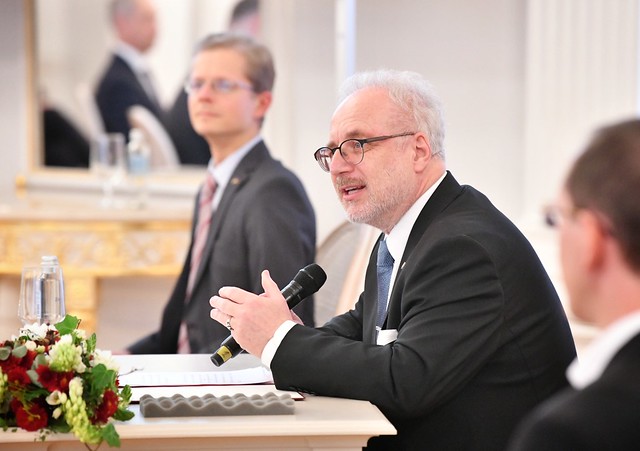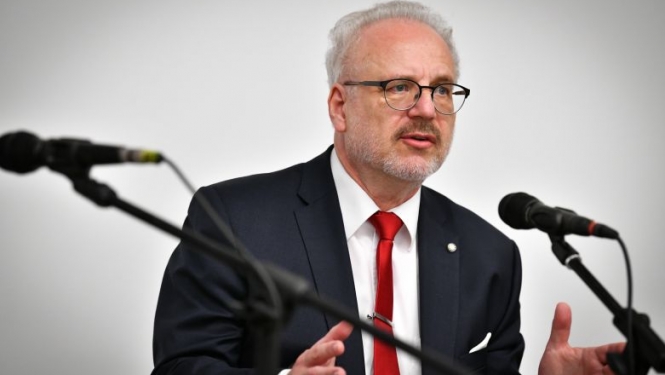Good afternoon ladies and gentlemen,
Dear participants, enthusiasts of Latvian language and everyone who cares about our language,
I am happy to welcome everyone to this discussion aligned to proposed Official Language Day where we are going to talk about the positions of Latvian as the official language of the Republic of Latvia.
According to our constitution, Satversme, Latvian is the only official language in Latvia. Article 4 of the Constitution stipulates that Latvian is the official language, and preamble also reiterates that it is the only official language. Latvian language is integral element of identity of Latvian nation, as well as national and constitutional identity of Latvian State. This means that the official language status of Latvian makes it one of the core constitutional values. In other words, Satversme has given Latvian language the highest possible constitutional regard.
I have proposed to designate the 15 October as the Official Language Day. The idea behind the tradition of celebrating the Official Language Day is, firstly, to promote better public awareness about the role and constitutional significance of the official language. Secondly, to draw attention to language policy. We would mark this day every year by taking stock of language policy and what future issues it should tackle. Thirdly, it would boost the prestige of the official language and promote its use across various groups of society.
Official language status mentioned in Article 4 of Satversme and its preamble is not merely a statement. By the way, as we all know, our constitution is not merely a collection of statements, every word you can find there has a clear purpose. So, of course, sentence about Latvian being the only official language also has significant importance and implications. It primarily means that official language must be used in communication across all fields and situations in public realm. It largely depends on attitude and awareness because, as we all know, that is not how it always happens in real life, and the actual use of the official language is what linguists call the linguistic behaviour of the society.
We have gathered here today to discuss the current linguistic behaviour in our country. We are here to put a finger on challenges and decide what needs to be done. On one hand, Latvian as the official language is still overwhelmed by strong living legacy of Soviet occupation when Russification was enforced. On the other hand, a kind of servilism or willingness of Latvians to voluntarily, without much need, switch to another language instead of continuing to speak Latvian, which would be much more appropriate. These are the main two factors that influence the use of Latvian as the official language in everyday situations. There is also another issue. People are increasingly acquiring new skills and pursuing their interests beyond information realm of the Latvian language and content available in Latvian. I am, of course, talking about information in other languages. This is a trend that is especially strong with our young people.
Latvian language, which is an integral for Latvian nation and national identity is in an unprecedented situation. Of course, we could draw certain parallels with the turn of 19th and 20th century, the time before founding of Latvian State. However, back than it was due to existing hierarchy where Latvian language still had to prove its social worth. In other words, Latvian still had to go through the process of language emancipation. Today’s situation is different. As I already mentioned, formally Latvian language is at the top of this hierarchy, but the pressure from other languages and the unique linguistic behaviour, which is largely determined by historical legacy and national self-esteem, in a way ‘neutralises’ the high status of Latvian language.
So, we need to treat the matter and explore it very seriously. We need to be much more active when it comes to formulating our future Latvian language policy. It must factor in current risks and challenges.
What is the most efficient and successful response to current situation? How to prevent completely uncontrolled language use and deterioration? There are, of course, situations in other parts of the world when a language loses its status, deteriorates in terms of the number of speakers and richness. But we do have our nation state and language, and I think it is in our best interests to keep it that way. Single official language is important for democracy as well. Shared language spoken irrespectively of ethnic background or home language is important for public debate on issues important for the whole society. Shared language of communication that can be used in public debate about issues of common interest is crucial for democracy because it enables to take vital decisions collectively.
In conclusion, I would like to wish all of you a very open and constructive discussion. Good luck to everyone working towards better future for all of us!






